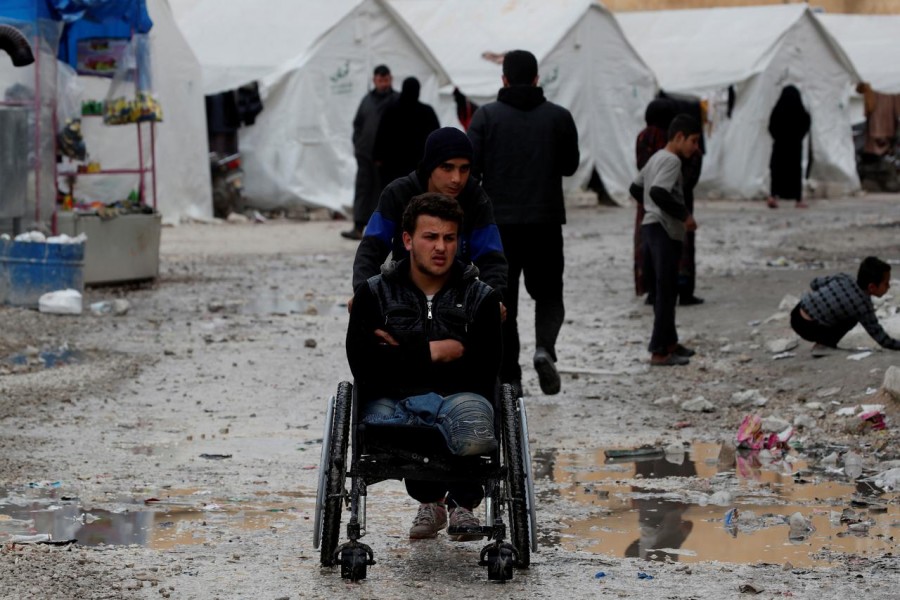Groups of refugees and migrants are heading towards the EU after Turkey said it would not abide by a deal to stop them reaching Europe.
Turkey's communications chief said the country had not received enough support in hosting millions of Syrian refugees.
Its decision followed a deadly attack on Turkish troops by Syrian government forces in northern Syria.
The incident sparked fears of a major escalation involving Turkey and Syria's military ally, Russia.
Greece and Bulgaria - which border Turkey - have sent reinforcements to prevent people entering. Greek police have been deterring attempts to cross the border with tear gas, reports say.
At least 33 Turkish soldiers were killed in a bombardment in Idlib, the last Syrian province where Syrian rebel groups hold significant territory, reports the BBC.
Syrian government forces, supported by Russia, have been trying to retake Idlib from jihadist groups and Turkish-backed rebel factions.
The UN Security Council is set to meet later in response to events in Syria. EU foreign policy chief Josep Borrell warned the situation risked "sliding into a major open international military confrontation".
Why is Turkey letting migrants leave?
The country is hosting 3.7 million Syrian refugees as well as migrants from other countries such as Afghanistan - but had previously stopped them from leaving for Europe under an aid-linked deal with the EU.
Turkish TV showed migrants making their way on foot to the border with Greece near the Turkish town of Edirne, and further south boarding boats to cross to Lesbos.
Greek Prime Minister Kyriakos Mitsotakis said "significant numbers" of migrants had gathered at the border but said "no illegal entries into Greece will be tolerated". Land and sea border security was being tightened, he said.
Turkey's communications director Fahrettin Altun said the migrants were now also Europe and the world's problem. He said Turkey had "no choice" but to relax border controls because it had not received enough support in hosting Syrian refugees.
However there was confusion over Turkish policy after the EU's Mr Borrell said Foreign Minister Mevlut Cavusoglu had reassured him that Turkey remained committed to controlling the flow of migrants to the EU.
Mr Altun had earlier said Turkey did not have the capacity to allow entry to the nearly one million Syrians fleeing the fighting in Idlib. He called for the international community to protect civilians in Idlib from "genocide" by imposing a no-fly zone.
At least 465 civilians, including 145 children, have been killed in Idlib since December, the vast majority of them victims of attacks by the Syrian government and its allies, according to the UN. Children are also dying from the cold.
What has happened since the attack on Turkish troops?
The Turkish and Russian presidents spoke by phone on Friday. Recep Tayyip Erdogan and Vladimir Putin agreed on the need for "additional measures" to normalise the situation, with the possibility of a summit in the near future, the Kremlin said.
Russia also says top Russian and US military officials have discussed the situation in Idlib.
Nato Secretary General Jens Stoltenberg promised "strong political support and... practical support" for Turkey while the US said it "stood by" Turkey.
Russia says the Turkish troops were attacked while operating alongside jihadist fighters. Moscow denies its own forces were involved in the fighting in the Balyun area.
Turkey said it had hit 200 Syrian government targets in retaliation, "neutralising" 309 soldiers. UK-based monitoring group the Syrian Observatory for Human Rights said 20 Syrian troops had been killed.
Russia said it was in constant contact with Turkey to ensure Turkish troops were not targeted in Idlib and had not been informed that Turkish forces were active at Balyun.
But Turkish Defence Minister Hulusi Akar insisted the Russians had been informed about the locations of Turkish troops and said no armed groups had been present near the soldiers who were attacked. He also said ambulances had been hit in the attack.
Two Russian warships equipped with cruise missiles have passed through Istanbul's Bosphorus Strait on their way to the Syrian coast.
What is the context?
The attack on Turkish troops came after Turkish-backed rebels retook the key town of Saraqeb, north-east of Balyun. Idlib is the last Syrian province where Syrian rebel groups still control significant territory.
Russia and Turkey are backing opposing sides in the civil war. Turkey is opposed to the government of Bashar al-Assad and supports some rebel groups.
Syria and Russia have rejected President Erdogan's demand to pull back to ceasefire lines agreed in 2018.
Turkey is also actively trying to prevent Syria's Kurdish community establishing control over the border region, fearing that this would encourage Kurdish separatism within Turkey itself.
It has been accused of seeking to drive Kurds away from the border to establish a safe area within Syria to rehouse two million of the refugees it is hosting.
Russia has rejected calls in the UN Security Council for a humanitarian ceasefire in northern Syria, saying the only solution is to chase what it calls terrorists from the country.
The Syrian government, which has regularly been accused of committing atrocities against civilians, says it is liberating Idlib from "terrorism".


